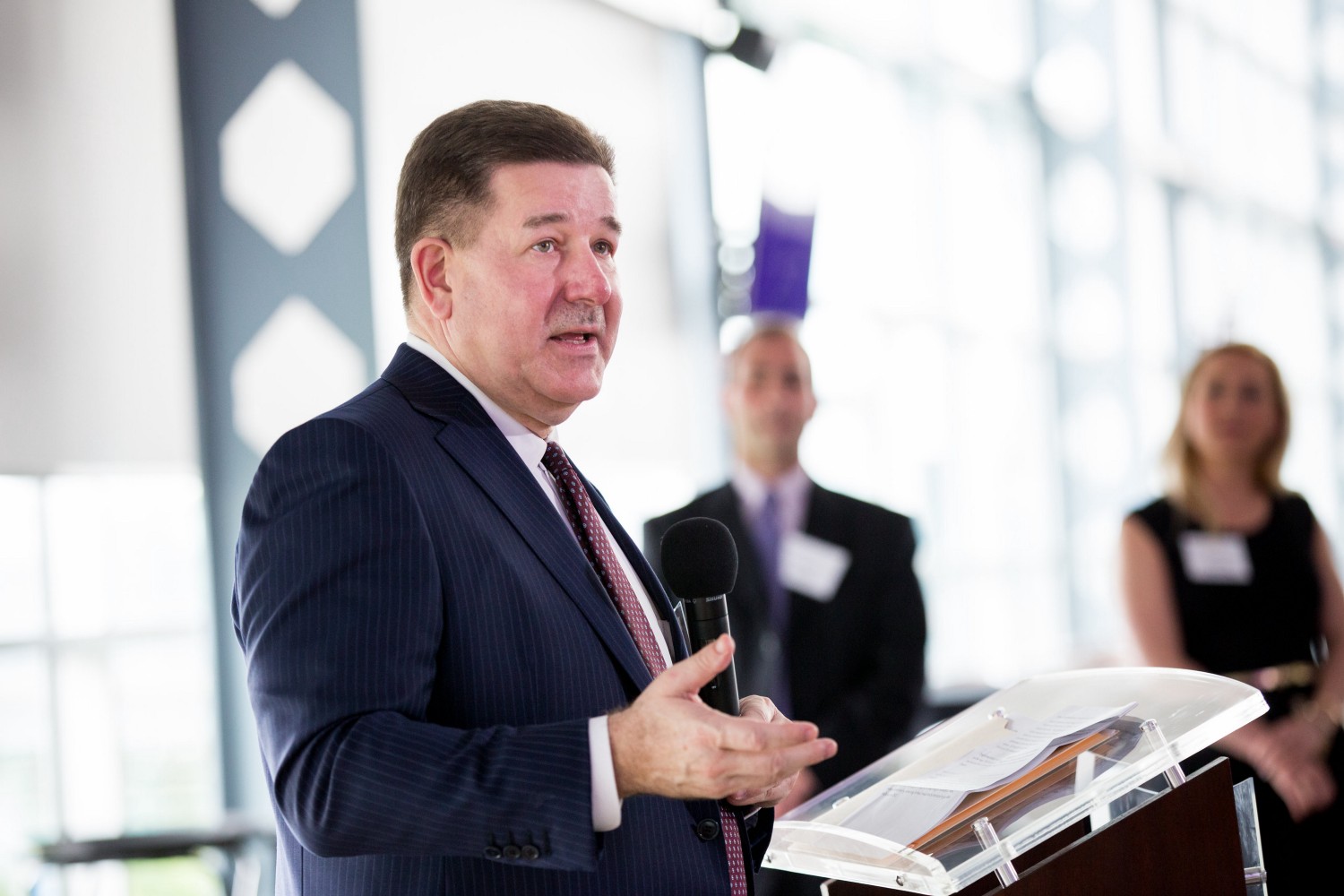At Bonova Advisory we interview C-suite, Thought leaders and Experts in Finance and Banking. This week I had the pleasure to interview Mike McGuire CEO of Grant Thornton, the world’s 6th largest professional services firm.
Please tell us about yourself
I grew up in a small town in the Midwest where my dad owned a grocery store. I worked in the store with my brothers starting at age 10, which helped me develop a strong work ethic, appreciate the value of teamwork in achieving a common goal and understand how a well-run business can contribute to a community. That has stayed with me to this day.
I’ve spent my career in Charlotte, first with Arthur Andersen for 20 years, and with Grant Thornton since 2002. At Grant Thornton, I’ve served as head of Markets, People & Culture, chief operating officer and Carolinas managing partner before becoming CEO in January 2015.
Can you share the funniest or most interesting story that happened to you since you began leading your company?
My wife and I were on vacation in Iceland and struck up a conversation with another couple at breakfast. They were excited to tell us that their son was in public accounting. I asked which firm, and they said Grant Thornton!
They asked me, “What do you do?” I told them I happened to be the CEO of Grant Thornton! I then asked why their son chose Grant Thornton. They said one word: “Culture.”
We’ve been working diligently for five years to build a strong, positive culture for our team. It was great to hear our work was paying off — even on vacation in Iceland!
How do you synchronize large teams to effectively work together?
I go back to lessons I learned working with my dad and brothers in our grocery store. I’ve long believed that a culture of collaboration and teamwork is the key to building the personal connections that enable people to thrive. I’ve simply scaled the experiences growing up in a family business to a large organization to inspire and motivate our people to function as a cohesive, high performing team.
One of our key “Culture Concepts” is: “How big a team am I playing on?” It means we always think about how people across the firm can contribute to a project or a client engagement, regardless of geography or organizational silos.
What is the top challenge when managing global teams in different geographical locations? Can you give an example or story?
I lead Grant Thornton in the US, which is part of a global network of firms under the Grant Thornton brand. That’s 50,000 people around the world at 600 offices in 135 countries. It’s a big challenge to coordinate work across such widely dispersed teams. Technology helps a lot with communication and collaboration.
But it’s our unified culture and values that drive us to build relationships with teammates around the world so we can work together for clients. The key is to build trust through relationships. I serve on the global board of Grant Thornton International and have built strong relationships with my colleagues in the UK, India, China, Australia, Canada and many other countries. When we have a client who needs help, I can make a point-to-point connection anywhere in the world to provide rapid response. We call it “Status Go!”
Based on your personal experience, what are the “5 Things You Need To Know To Successfully Manage a Team.” (Please share a story or example for each, Ideally an example from your experience)
Set a clear vision that inspires your team. Teams want to know how they fit in the whole picture of the vision. They want to know why what they do matters. They want to have a purpose and feel valued for their contributions. Leaders of teams really can’t be appointed. Leadership is earned. If you can’t inspire people, they won’t follow, and you won’t lead.

Build a strong culture and let teammates see your human side. People thrive on relationships. I take pride in getting to know names and “fun facts” about our people. I also like for people to know me. Some of our people know, for example, that I like deviled eggs. When I show up in another office, so do the deviled eggs! It’s a small thing, but it connects us. And those small connections make deeper relationships possible. About a year into our culture journey, one of our most skeptical partners came into my office and closed the door. With tears in his eyes, he told me our culture work had improved not just his relationships with clients and teammates, but his relationships with family and friends as well. That’s when I knew our culture journey was real and would succeed.
Value the input of your team. We recently launched an enterprise-wide innovation platform to allow anyone in our organization to contribute ideas to help us succeed. Teammates are submitting ideas on how we can improve our client service, our organization and the daily lives of our people. When people see that their ideas are adopted, they can see the impact they’ve had in shaping our future. They can truly make a difference. It binds them to our firm like glue.
Promote your team to build pride in your organization. Grant Thornton has stepped out boldly with a refresh of our brand. We’re investing in sponsorships with the Cubs, Red Sox and the Tony Awards. We are partnering with the PGA Tour, sponsoring Rickie Fowler and being one of three sponsors of The Players Championship. We brought on world-class talent like the renowned economist Diane Swonk as our chief economist. When our people see our brand in the market, they say, “Hey, that’s my company!”
Invest in the future to support your team. Our profession faces disruption, like so many others. New technologies such as data analytics, artificial intelligence, robotics, blockchain and others are reshaping the very nature of the work we do. Investing in these technologies and investing in our people through training and providing unique experiences demonstrates our commitment to their lifelong learning.
What advice would you give to other CEOs or founders to help their employees to thrive?
Build and invest in your team’s culture intentionally and consistently. You can get the most out of people and have the kind of agility and flexibility you need to navigate rapid change through a strong, positive culture where people trust and believe in one another. Culture is not a “nice-to-have,” it’s a must-have.
Most times when people quit their jobs they actually “quit their managers.” What are your thoughts on retaining talent today?
One of the things I’m proudest of is that our retention rate is among the highest in the industry. It tells me we’re succeeding in building a firm where people want to work, and where we all believe we can grow and develop and have a great career.
Teaching and learning go both ways here. We all learn from each other every day and we encourage a culture of curiosity that keeps people invested and interested. We experiment, create and innovate — we succeed and we fail — as a team.
You are a person of great influence. If you could inspire a movement that would bring the most amount of good to the most amount of people, what would that be? You never know what your idea can trigger.
I would inspire a movement for a healthy, high-performance culture in which we all assume positive intent, find the best in everyone and focus more on what we have in common than our differences.
At Grant Thornton, one of our culture principles is “appreciation,” which I’ve found immediately changes people’s attitudes and perspectives. We get far more done together when we appreciate people’s strengths and help them succeed. We foster inclusiveness and diversity, which leads to more curiosity, more creativity and more innovative solutions.
This might sound easy, because it is! I encourage everyone to try it. Tell someone today what you appreciate about them and see what happens. I guarantee you will see a smile!
Can you please give us your favorite “Life Lesson Quote”? Can you share how that was relevant to you in your life?
Walt Disney once said, “We keep moving forward, opening new doors, and doing new things, because we’re curious and curiosity keeps leading us down new paths.”
Curiosity has been the constant of my career. I got into accounting because a chance conversation sparked my interest. As my career has unfolded, curiosity — about people, business, technology, the economy — has opened new doors every step of the way. However, curiosity alone won’t cut it. You have to have the courage to act. As with Walt Disney, he was not only curious, but he took the next step in “opening new doors” and did new things.
I once heard humans described as “informavores.” I really like that. An appetite for knowledge is the ultimate fast-track to success.
Originally published at medium.com


